#frank chodorov
Text
"Freedom is essentially a condition of inequality, not equality. It recognizes as a fact of nature the structural differences inherent in man — in temperament, character, and capacity — and it respects those differences. We are not alike and no law can make us so. ...When you seek the taproot of reform movements, you find an urgency to eradicate these innate differences and to make all men equal; in practice, this means the leveling-off of the more capable to the mediocrity of the average. That is not Freedom.”
Frank Chodorov (1887-1966) American political writer.
143 notes
·
View notes
Text

“As for me, I will punch anyone who calls me a conservative in the nose. I am a radical.”
― Frank Chodorov
0 notes
Text
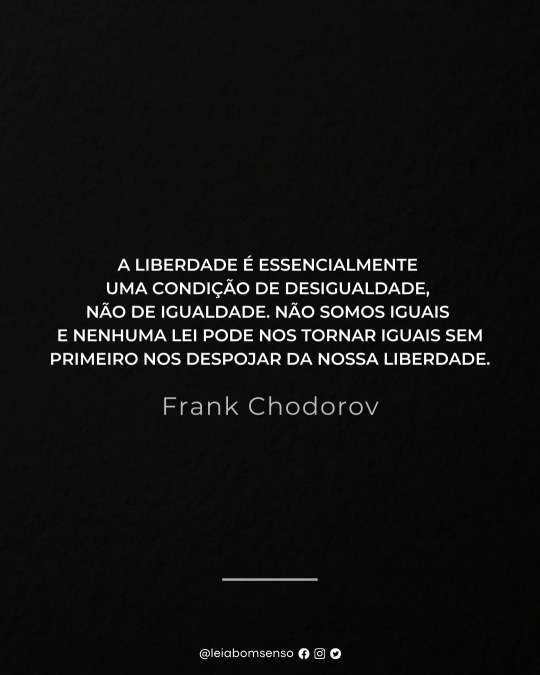
A liberdade é essencialmente uma condição de desigualdade, não de igualdade. Não somos iguais e nenhuma lei pode nos tornar iguais sem primeiro nos despojar da nossa liberdade.
Frank Chodorov
0 notes
Photo
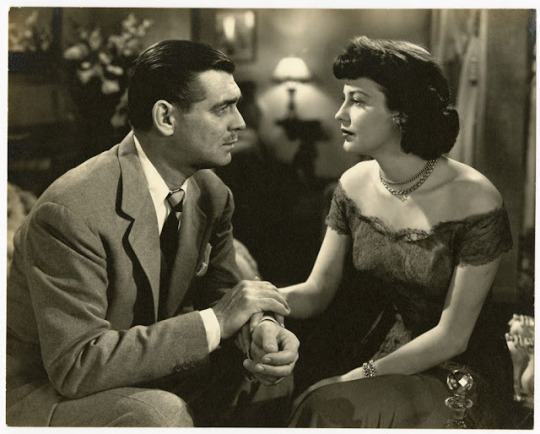


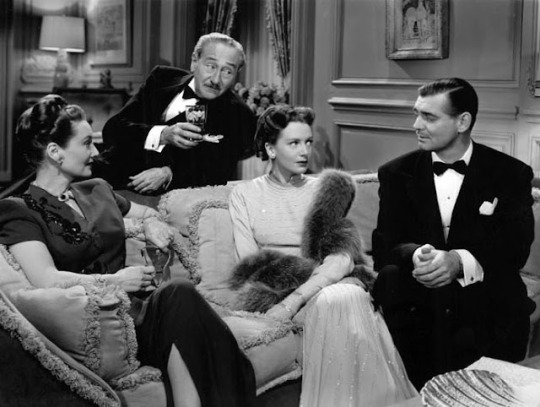
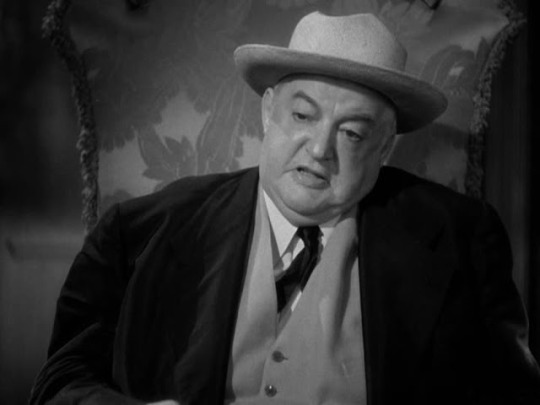

The Hucksters (Jack Conway, 1947)
Cast: Clark Gable, Deborah Kerr, Sydney Greenstreet, Adolphe Menjou, Ava Gardner, Keenan Wynn, Edward Arnold, Aubrey Mather, Richard Gaines. Screenplay: Luther Davis, Edward Chodorov, George Wells, based on a novel by Frederic Wakeman. Cinematography: Harold Rosson. Art direction: Cedric Gibbons, Urie McCleary. Film editing: Frank Sullivan. Music: Lennie Hayton.
The Hucksters was made in the era depicted in Mad Men, when men who had served in World War II were returning to their civilian jobs. In the advertising business, that included men like Don Draper in the TV series and Victor Norman in the movie, men whose wartime experience had toughened them and given them a fresh angle on the business of selling to the postwar clientele. If Mad Men seems to us to have a more reliable point of view than The Hucksters on that business, it's partly because hindsight is keener than the contemporary view, but also because popular entertainment is less tight-assed now. Frederic Wakeman's novel was a bestseller in part because it was frank about the sex lives of its characters, which movies in the Production Code era couldn't be. So Clark Gable's Victor Norman is turned into a more buttoned-up character than Jon Hamm's Don Draper, but censorship especially worked to a disadvantage for Deborah Kerr, in her first American film. Kerr is forced to be chaste and prim -- characteristics that would type her in the movies until 1953, when Fred Zinnemann finally allowed her to have a sex life in From Here to Eternity. Kerr's character may agree to go away for a weekend with Vic, but only after she's assured that they will have separate rooms at opposite ends of the hotel. And when she discovers that they instead have adjoining rooms with a connecting door, she bolts. The effect on the movie is to sap any chemistry that MGM might have hoped Gable and Kerr would have. In contrast, Gable and Ava Gardner, as one of Vic's old girlfriends, strike fire immediately, which makes the ending of the movie, in which Gable's and Kerr's characters wind up together, feel phony. The Hucksters, coming a year after her breakthrough performance in Robert Siodmak's The Killers, helped make Gardner a star. Kerr had to muddle through in costume parts in movies like Quo Vadis (Mervyn LeRoy, 1951) and The Prisoner of Zenda (Richard Thorpe, 1952) before finally getting a chance to be sexy. There is some zippy dialogue in the movie, and the hits on the advertising business are often funny, but the only real reason to see The Hucksters today is to watch some skillful old character actors like Adolphe Menjou and Sydney Greenstreet do their thing. Greenstreet plays an imperious soap manufacturer sponsor with non-negotiable ideas about what his commercials should be, and likes to intimidate his advertising clients by doing things like hocking a loogie on the conference table to get their attention. If the film had stuck with the ad biz and not strayed off into tiresomely predictable romance, it might have been a classic, or at least a lot better.
0 notes
Link
Check out this listing I just added to my Poshmark closet: The Income Tax Root of All Evil by Frank Chodorov Revised Edition 1959.
0 notes
Text

522 notes
·
View notes
Link
The early American knew that freedom was nothing more than the absence of external restraint on behavior; the government could not give you freedom, it could only take it away.
Perhaps the removal of trade restrictions throughout the world would do more for the cause of universal peace than can any political union of peoples separated by trade barriers.
Freedom is essentially a condition of inequality, not equality. It recognizes as a fact of nature the structural differences inherent in man - in temperament, character, and capacity - and it respects those differences. We are not alike and no law can make us so.
Popular suffrage is in itself no guarantee of freedom. People can vote themselves into slavery.
It is in the free market that self-interest finds its finest expression; that is a cardinal point in individualism. If the market is regularly raided, by robbers or the government, and the safety of property is impaired, the individual loses interest in production, and the abundance of things men live by shrinks. Hence, it is for the good of society that self-interest in the economic sphere be allowed to operate without hinderance.
There cannot be a good tax nor a just one; every tax rests its case on compulsion.
Since the state thrives on what it expropriates, the general decline in production that it induces by its avarice foretells its own doom. Its source of income dries up. Thus, in pulling society down it pulls itself down. Its ultimate collapse is usually occasioned by a disastrous war, but preceding that event is a history of increasing and discouraging levies on the marketplace, causing a decline in the aspirations, hopes and self-esteem of its victims.
We cannot restore traditional American freedom unless we limit the government's power to tax. No tinkering with this, that, or the other law will stop the trend toward socialism. We must repeal the Sixteenth Amendment.
The proposal to quit voting is basically revolutionary; it amounts to a shifting of power from one group to another, which is the essence of revolution. As soon as the nonvoting movement got up steam, the politicians would most assuredly start a counter-revolution. Measures to enforce voting would be instituted; fines would be imposed for violations and prison sentences would be meted out to repeaters.
The state aquires power - and because of its insatiable lust for power it is incapable of giving up any of it. The state never abdicates.
Read More
6 notes
·
View notes
Quote
The hue and cry over the cost of living would make more sense if it were aimed at taxation, the largest single item in the cost. And humanitarians who are concerned with this matter would do well to consider this: the incidence of indirect taxation falls most heavily on goods of the widest use, so as to ensure the greatest return, and as the poor are the largest segment of society and therefore the greatest consumers, it is on those least able to support the state that the burden is put.
Frank Chodorov
#Frank Chodorov#Chodorov#taxation#taxes#quotes#poor#poverty#cost of living#income tax#income#wage#wages#wage slavery
13 notes
·
View notes
Quote
The more subsidized it is, the less free it is. What is known as 'free education' is the least free of all, for it is a state-owned institution; it is socialized education - just like socialized medicine or the socialized post office - and cannot possibly be separated from political control.
Frank Chodorov
12 notes
·
View notes
Text
"The basic elements of contemporary right-wing thought can be reduced to three: First, there has been the now-familiar sustained conspiracy, running over more than a generation, and reaching its climax in Roosevelt’s New Deal, to undermine free capitalism, to bring the economy under the direction of the federal government, and to pave the way for socialism or communism. A great many right-wingers would agree with Frank Chodorov, the author of The Income Tax: The Root of All Evil, that this campaign began with the passage of the income-tax amendment to the Constitution in 1913.
The second contention is that top government officialdom has been so infiltrated by Communists that American policy, at least since the days leading up to Pearl Harbor, has been dominated by men who were shrewdly and consistently selling out American national interests.
Finally, the country is infused with a network of Communist agents, just as in the old days it was infiltrated by Jesuit agents, so that the whole apparatus of education, religion, the press, and the mass media is engaged in a common effort to paralyze the resistance of loyal Americans."
Richard Hofstadter, "The Paranoid Style in American Politics," Harper's Magazine, November 1964
57 notes
·
View notes
Text
"Private capitalism makes a steam engine; State capitalism makes pyramids."
– Frank Chodorov, Source: “Frank Chodorov: Champion of Liberty,” Aaron Steelman, FEE, (Foundation for Economic Education), (December 1, 1996)
#government#quotes#quotations#freedom#liberty#quoteoftheday#constitution#political quotes#politics#capitalism
12 notes
·
View notes
Text
"At first it was the incomes of corporations, then of rich citizens, then of well-provided widows and opulent workers, and finally the wealth of housemaids and the tips of waitresses. This is all in line with the ability to pay doctrine. The poor, simply because there are more of them, have more ability to pay than the rich"
Frank Chodorov (1887-1966) American author.
Statism only begins with rhetoric about the wealthy but it eventually comes for everyone.
69 notes
·
View notes
Quote
Freedom is essentially a condition of inequality, not equality. It recognizes as a fact of nature the structural differences inherent in man - in temperament, character, and capacity - and it respects those differences. We are not alike and no law can make us so.
Frank Chodorov
4 notes
·
View notes
Text
One of Bacevich’s longest selections is from Willmoore Kendall’s turgid semidefense of — a sort of “two cheers for” — McCarthyism. Bacevich makes room for this and for works from Frank Chodorov, John T. Flynn and Murray Rothbard. You ask: Who? Exactly.
hey! I know who those guys are!
1 note
·
View note
Text
Documentales, 26

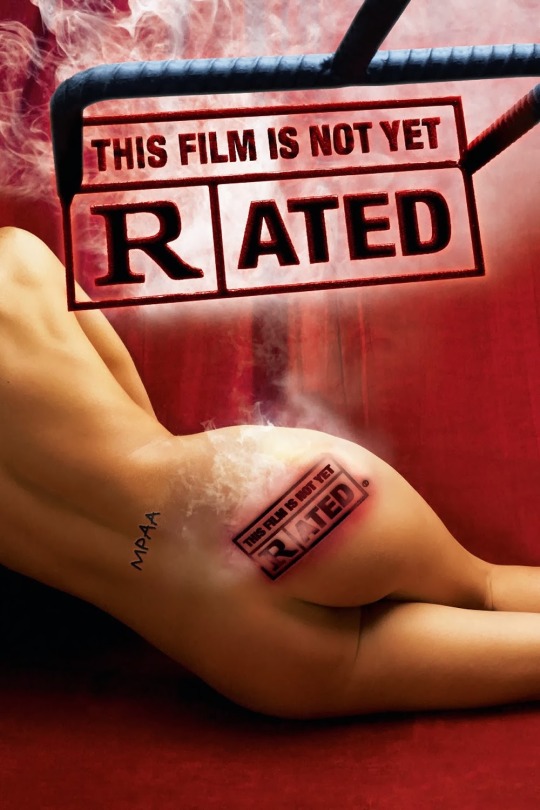
‘Los censores de Hollywoo’ ('This film is not yet rated’), Kirby Dick, 2006, VOSE.
Frustrado por el modo en que la Motion Picture Association of America (MPAA) otorga la clasificación por edades en Estados Unidos para ver una película, un realizador contrata un detective privado para llevar a cabo un experimento.
'This film is not yet rated’ cuestiona el arcaico y puritano sistema de dicha clasificación otorgado por este poderoso organismo oficial fundado en 1922. Una determinada clasificación puede hacer que la vida comercial de una película se vea en peligro, pues puede limitar la entrada al cine de mucha gente.
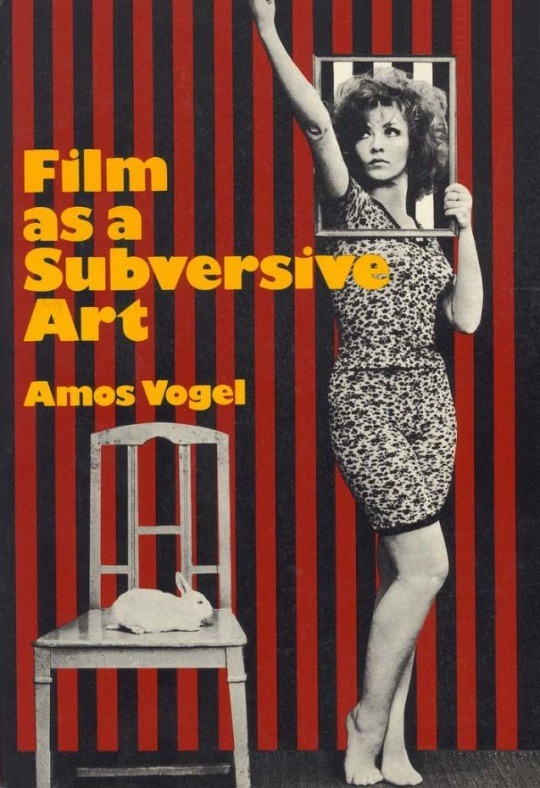
‘Film as a subversive art: Amos Vogel and cinema 16’, Paul Cronin, 2004, VO.
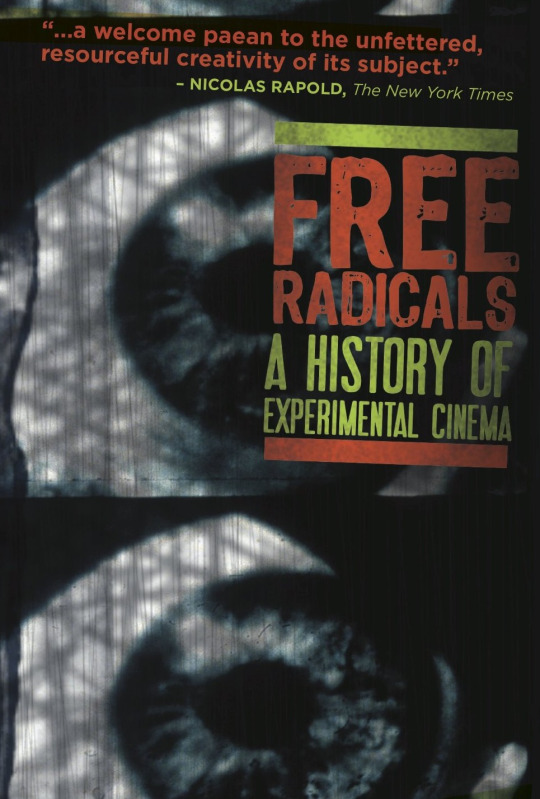
‘Free radicals: A history of experimental film’, Pip Chodorov, 2010, VOSE.
"These were homemovies. Then my dog peed on them. I though it looked cool”.
Así empieza la narración de un documental muy personal, cargado de instantes brillantes, imágenes abstractas, texturas granulosas y declaraciones delirantes.
Estructurado en torno a cuatro películas clásicas del cine de vanguardia como son ‘Rhythmus 21’, Hans Richter, 1921, ‘Rainbow dance’, 1936 y ‘Free radicals’, 1958 de Len Lye, junto a ‘Recreation’, Robert Breer, 1956-57.
Comentado con una voz en off en primera persona, empieza con un tono autobiográfico para proseguir hacia un carácter más o menos ortodoxo, mediante entrevistas a cineastas, imágenes de archivo y múltiples fragmentos de películas asombrosas.
Su director, Pip Chodorov, fundador de la distribuidora Light Cone, director del sello editorial Re-Voir y webmaster del foro Frameworks, presenta un documental dedicado a la historia del cine experimental estadounidense avant garde, desde 1921 hasta los inicios de los años sesenta. Muestra desde un punto de vista personal y pedagógico las vicisitudes de una serie de cineastas que hicieron florecer toda una escena cinematográfica profundamente singular.
Nacido durante el flower power en un entorno familiar peculiar, su madre era pintora y su padre realizador y productor de televisión interesado por el cine experimental, Chodorov absorbió desde pequeño la efervescencia cultural que le rodeaba. Recuperando el material familiar de aquella época, reivindica la libertad de la imagen en movimiento y sus estéticas novedosas radicalmente inusuales.
Incluye un buen número de entrevistas a primeras figuras del panorama internacional del género, como Hans Richter, Robert Breer, Jonas Mekas, Stan Brakhage, Peter Kubelka, Ken Jacobs, Michael Snow, Stan Vanderbeek y Nam June Paik entre otros, e incluye la presencia de Pip Chodorov, Stephan Chodorov, Maurice Lemaître, Len Lye, John Mhiripiri, M.M. Serra y Andy Warhol. Entre ellos sobresale el padre del director y embrión del documental, Stephen Chodorov, que durante los años 70 dirigió un programa de televisión pública sobre artistas del cine de vanguardia.
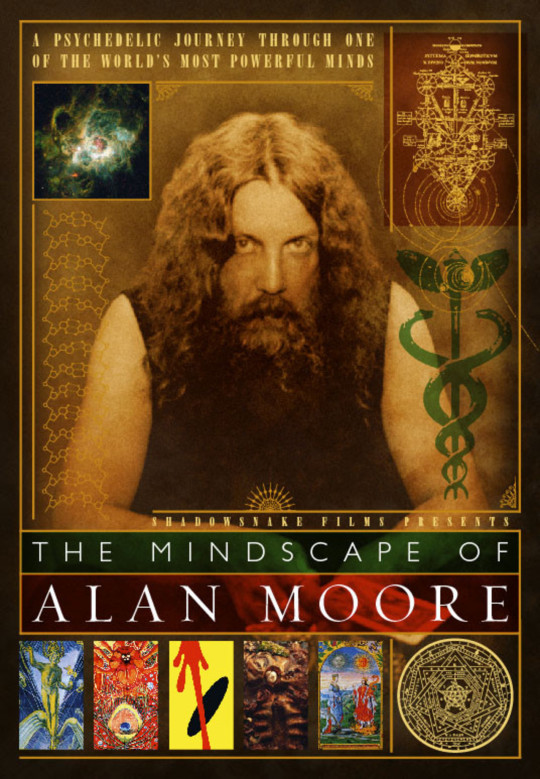
‘La mente de Alan Moore’ (’The mindscape of Alan Moore’), Dez Vylenz, 2003, VOSE.
Trata sobre el mítico guionista de cómics, algunos de ellos adaptados al cine, autoproclamado mago Alan Moore, que despliega en primera persona su personal cosmogonía vital.
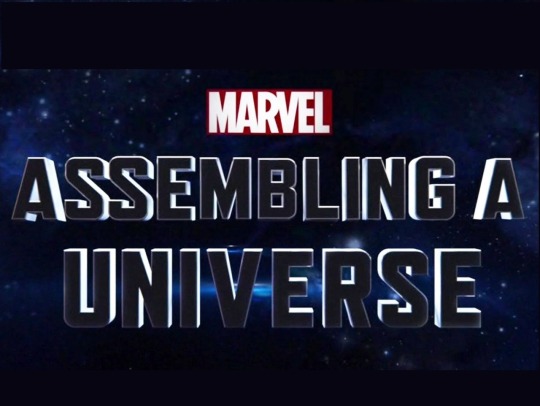
‘Marvel Studios: Assembling a Universe’, Brian Tyler, 2014, VOSE.
Presenta la historia de Marvel Studios y de su universo cinemático ofreciendo entrevistas exclusivas con miembros del reparto de sus películas, cortometrajes y de la serie 'Agents of S.H.I.E.L.D', junto con clips de los futuros films de la compañía.
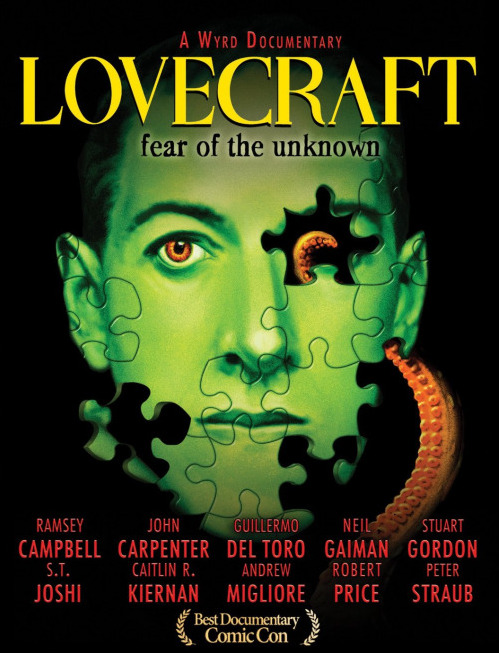
Howard Phillips Lovecraft.
‘Lovecraft. Miedo a lo desconocido’ (’Lovecraft. Fear of the unknown'), Frank H. Woodward, 2008, VOSE.
'Stuart Gordon on Lovecraft', VOSP.

‘Is the man who is tall happy?: An animated conversation with Noam Chomsky’, Michel Gondry, 2013, VOSE.
Curioso documental realizado por el cineasta Michel Gondry que incluye entrevistas con el lingüista, filósofo y activista Noam Chomsky y está realizado enteramente con animación tradicional.
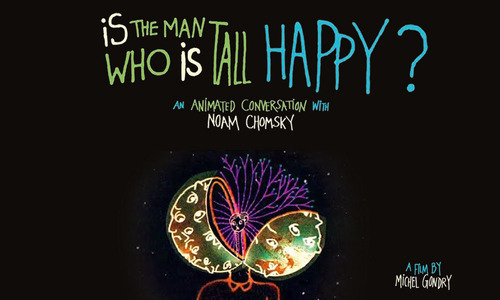

‘El celuloide oculto’ ('The celluloid closet’), Rob Epstein, Jeffrey Friedman, 1995, VOSE.
Trata sobre la homosexualidad en el cine dirigido por el experto documentalista Rob Epstein, poseedor de dos Oscar, y Jeffrey Friedman, cineasta, productor y ayudante de montaje de 'Toro salvaje’.

'A decade under the influence', Ted Demme, Richard LaGravenese, 2003, VO.
Trata sobre el mundo del cine en la década de los setenta, cuando desapareció el sistema de estudios y se produjo un cambio radical en la manera de contar historias. Durante aquellos años directores americanos casi todos bajo la influencia de directores extranjeros como Godard, Antonioni, Kurosawa o Fellini, revolucionaron el mundo del cine para siempre.
Con la presencia de Martin Scorsese, Francis Ford Coppola, Robert Altman, Peter Bogdanovich, Julie Christie, Dennis Hopper, Sidney Lumet, Milos Forman, Robert Towne, Sydney Pollack, Paul Schrader, William Friedkin, Roger Corman, Roy Scheider, Jon Voight, Paul Mazursky, Richard LaGravenese, Jack Nicholson, Paul Thomas Anderson y Steve Soderberg entre otros.
3 notes
·
View notes
Link
The early American knew that freedom was nothing more than the absence of external restraint on behavior; the government could not give you freedom, it could only take it away.
Perhaps the removal of trade restrictions throughout the world would do more for the cause of universal peace than can any political union of peoples separated by trade barriers.
Freedom is essentially a condition of inequality, not equality. It recognizes as a fact of nature the structural differences inherent in man - in temperament, character, and capacity - and it respects those differences. We are not alike and no law can make us so.
Popular suffrage is in itself no guarantee of freedom. People can vote themselves into slavery.
It is in the free market that self-interest finds its finest expression; that is a cardinal point in individualism. If the market is regularly raided, by robbers or the government, and the safety of property is impaired, the individual loses interest in production, and the abundance of things men live by shrinks. Hence, it is for the good of society that self-interest in the economic sphere be allowed to operate without hinderance.
There cannot be a good tax nor a just one; every tax rests its case on compulsion.
Since the state thrives on what it expropriates, the general decline in production that it induces by its avarice foretells its own doom. Its source of income dries up. Thus, in pulling society down it pulls itself down. Its ultimate collapse is usually occasioned by a disastrous war, but preceding that event is a history of increasing and discouraging levies on the marketplace, causing a decline in the aspirations, hopes and self-esteem of its victims.
We cannot restore traditional American freedom unless we limit the government's power to tax. No tinkering with this, that, or the other law will stop the trend toward socialism. We must repeal the Sixteenth Amendment.
The proposal to quit voting is basically revolutionary; it amounts to a shifting of power from one group to another, which is the essence of revolution. As soon as the nonvoting movement got up steam, the politicians would most assuredly start a counter-revolution. Measures to enforce voting would be instituted; fines would be imposed for violations and prison sentences would be meted out to repeaters.
The state aquires power - and because of its insatiable lust for power it is incapable of giving up any of it. The state never abdicates.
Read More
1 note
·
View note